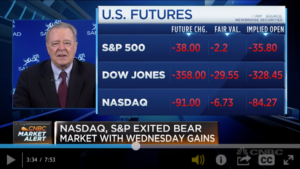Summary: I like waking up in the dark. At least that’s what I told myself as I drove to the studio at 4:45AM this morning to do a CNBC Squawk on the Street hit. Truth is, I love doing it both because preparing for the show helps me organize my thoughts and because I get to work with old friends like Carl Quintanilla, Sara Eisen, and Mike Santoli. Today’s topic was why markets have become so volatile. You can see a video clip by clicking here.
 The answer is Open Mouth Operations–ill-advised statements by senior government officials who should know better. Last week there were rumors that Trump, unhappy with rising interest rates, was thinking of firing Fed Chairman Powell. Then, as he was jetting off to vacation in Cabo San Lucas, Treasury Secretary Mnuchin launched a tweet saying he had contacted the heads of all of the major banks and, don’t worry, they have plenty of cash to avoid a crisis! You really couldn’t make this stuff up if you tried.
The answer is Open Mouth Operations–ill-advised statements by senior government officials who should know better. Last week there were rumors that Trump, unhappy with rising interest rates, was thinking of firing Fed Chairman Powell. Then, as he was jetting off to vacation in Cabo San Lucas, Treasury Secretary Mnuchin launched a tweet saying he had contacted the heads of all of the major banks and, don’t worry, they have plenty of cash to avoid a crisis! You really couldn’t make this stuff up if you tried.
There is really only one way to manage a portfolio in this environment–hold lots of cash. Then, when someone says something especially dumb, you can buy the stocks of great companies at huge discounts. But only buy the open you really love–companies that will be here long after we are. And only buy in small bites because the discounts may be even bigger next week.
The one fundamental point I will raise is that these gyrations have precious little to do with what most people call “the economy”, the near-term course of GDP. There are two reasons for this.
First, the duration of the stock market is huge–almost 40 years. If the stock market were a bond and its free cash flows the bond’s coupons, you would have to wait 40 years before the present value of the cash flow adds up to 50% of the price you are paying today. (i.e., the duration of a cash flow stream is the fulcrum of its present values). For practical purposes, this means the intrinsic value of a stock should depend on GDP and interest rates over at least the next 40 years. Today’s news doesn’t mover those numbers at all.
Second, there are two economies, not one. One is the paycheck economy that everyone talks about, measured by GDP, jobs, consumer spending and the like. The second is the net worth economy, measured by the stock prices, bond prices, real estate prices, debt prices, and the net worth of the people who own (or owe) them.
The net worth economy is the important one to understand because it is so huge. Americans hold over $200 trillion in financial assets, $100 trillion of tangible assets, and have a $100 trillion net worth, all many times larger than our roughly $20 trillion GDP. To a first approximation, all major economic disruptions arise in the net worth economy.
The difference between the behavior of the two economies is also key to understanding the inequality issue, known as the 1% problem, that is wreaking such political havoc around the world today. The issue is not the difference between high and low incomes, it is the difference between people who rely on a paycheck and those who live on the income generated by their highly-concentrated net worth. This has been especially true since the 2008 financial crisis because the method the government chose to deal with it–Quantitative Easing–has inflated asset prices but failed to inflate paychecks.
Asset prices, by their very nature, are much more volatile that income flows. That means QE and the current attempts to unwind it will have much bigger effects on asset returns than on GDP flows. And so will Open Mouth Operations.
It also has things to say about the direction of budget deficits–not good–and about which kinds of investments are more suited than others to this net worth economy-driven world. More on that in a later post.
JR








